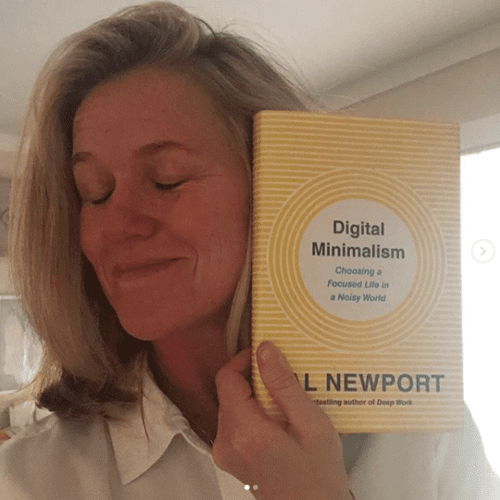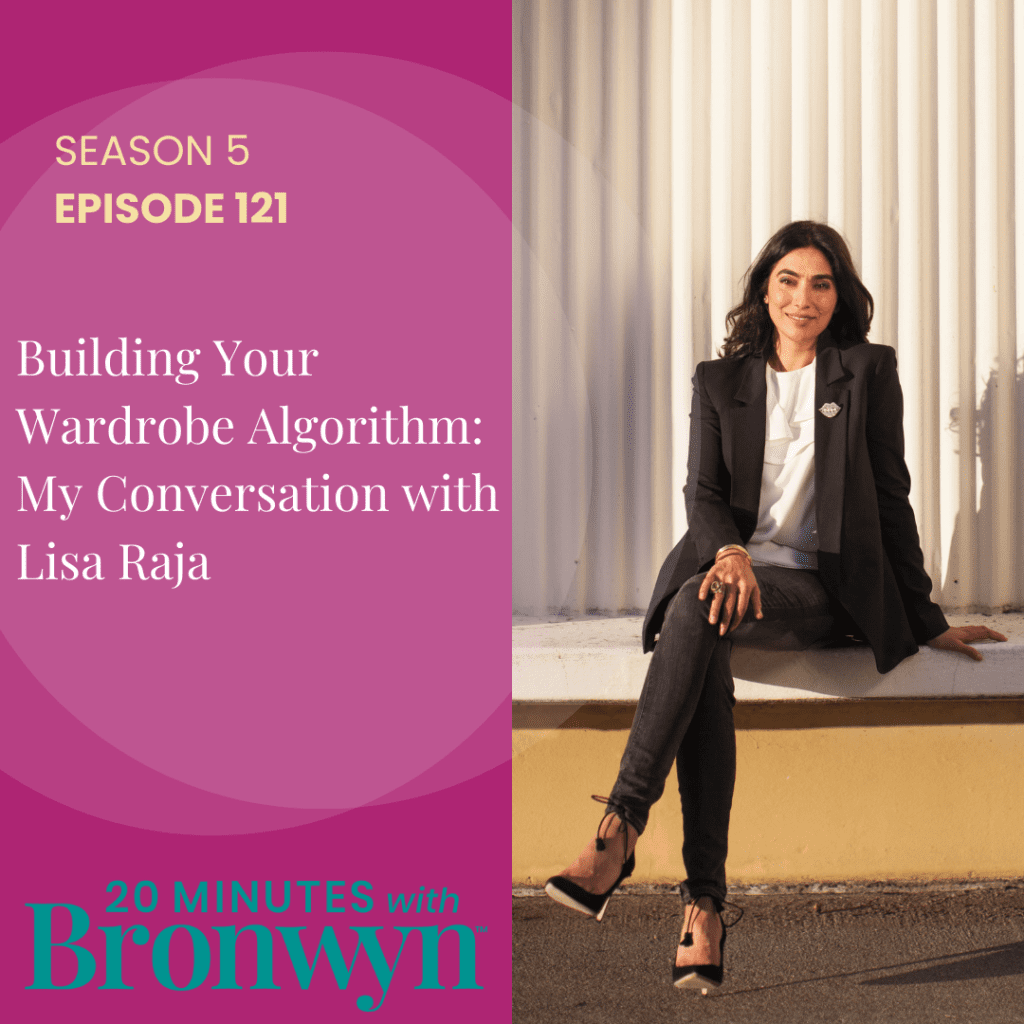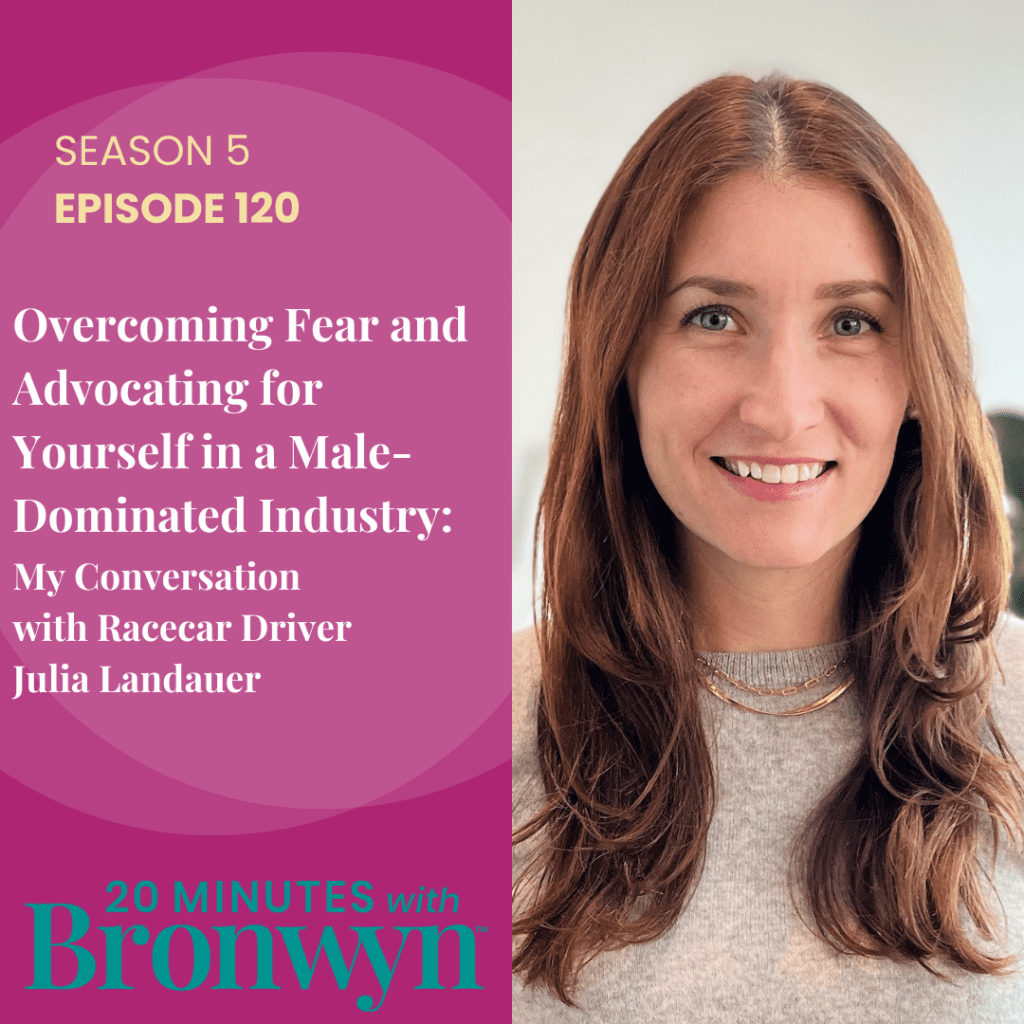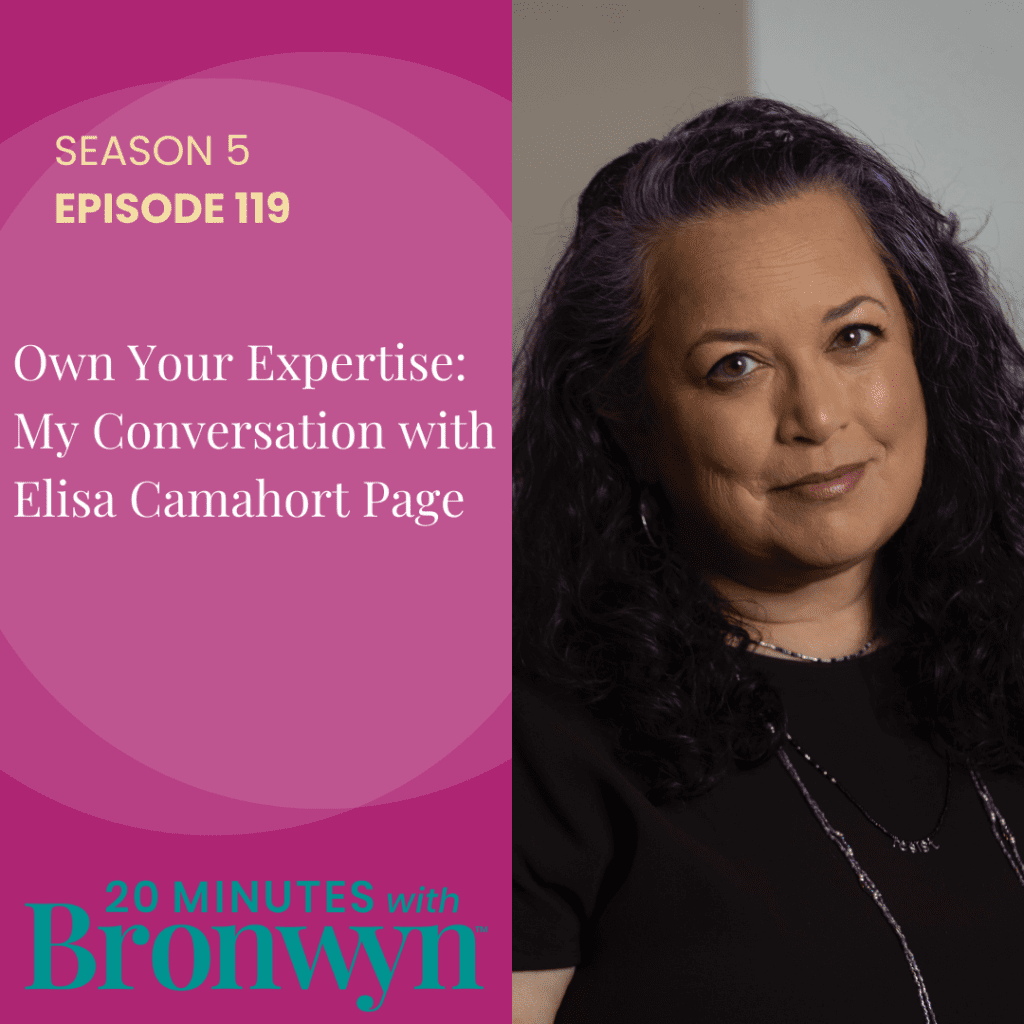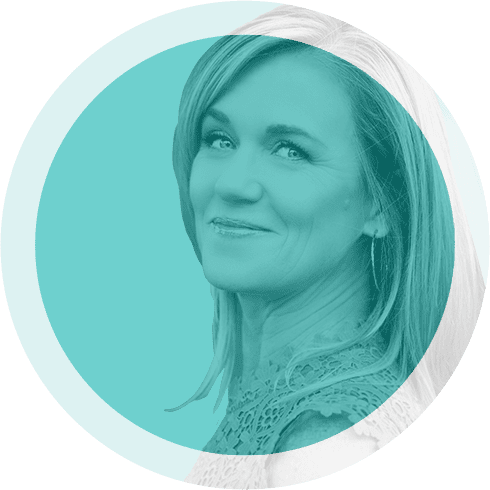Friends!! After a nice long break in August, I’m back at it and this episode is a doozy. August was an “optional techonology”-free month. No Insta. No Facebook. Only email and text, and only when absolutely necessary. It was a WILD ride, people, and I love the way the episode turned out (give it a listen here). But if you haven’t had the time to listen or still cannot fathom how podcasts work (don’t be embarrassed. You’re not alone), here are the highlights …
Oh wait, but before we dive in, if you’re enjoying the podcast, it would mean the absolute world to me if you could rate it and review it! Here’s how to do it:
Step One (Cut a hole in the box … sorry, couldn’t resist):
Search for my podcast: 20 Minutes with Bronwyn
Step Two:
Click on my album art:
Step Three:
Scroll through episodes until you get to the Ratings & Reviews section, and either click on the stars (I’m partial to 5, but that’s just me)
Step Four: BONUS
Keep scrolling to “write a review”
That’s it! It makes a HUGE difference for me and the show if we have lots of happy listeners sharing the love. So thank you in advance.
Ok with no further ado, welcome to my detox ….
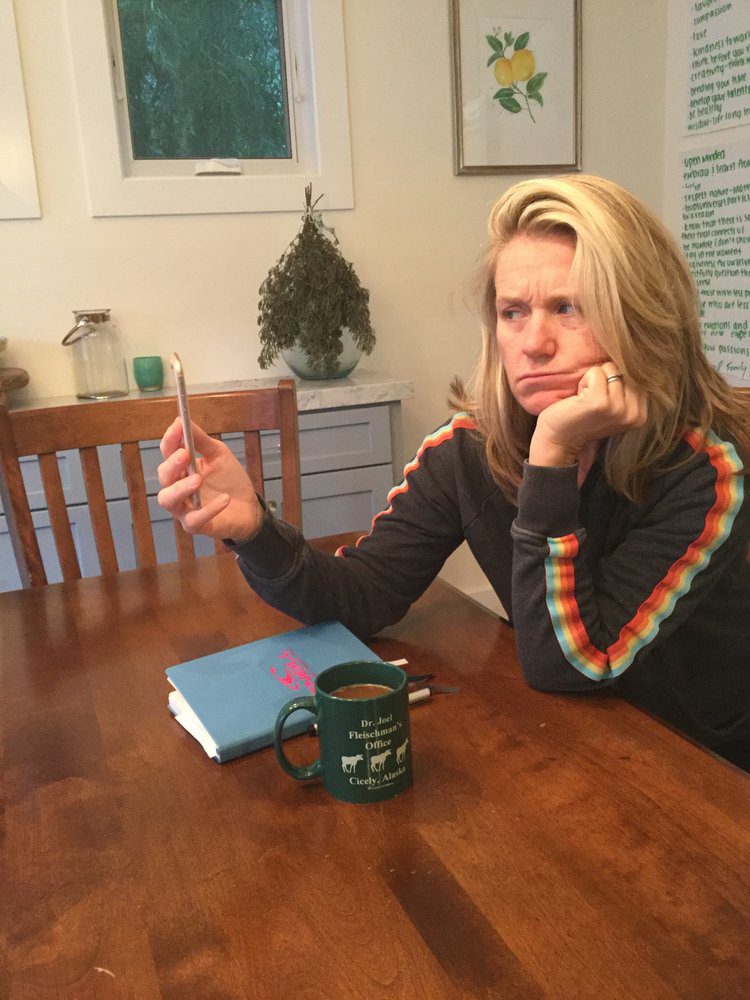
****
According to a report last year from eMarketer, US adults spent an average of 3 hours, 35 minutes per day on mobile devices in 2018, an annual increase of more than 11 minutes. By 2019, they are expecting mobile to surpass TV as the medium attracting the most minutes in the US.
I mean, duh.
That’s over 25 hours per week spent with our necks bent over our little black mirrors. That’s like each of us having a second (or third) UNPAID job.
But as alarming as this statistic is, it’s hardly surprising. In fact, I think if I’m honest, I’m wondering: do I even want those extra 25 hours?
When it’s in a non-work capacity, I use my screen to escape … to relax my addled brain … procrastinate a little … check in on how everyone’s doing on social media.
Is that such a bad thing? What if it’s just what we need right now … a way to escape ourselves for a few hours a day. What if it’s just part of coping with the “unbearable lightness of being” alive in 2019??
I guess I started to get curious … am I really missing out on something major during those 25 hours of screen time each and every week?
And just how badly do I want to know?
If you know me, you know that this topic has bothered me for some time, and while I’ve made huge progress on my social media consumption, I still have this nagging suspicion that it’s got a much bigger hold on me than I would like to admit. So when Cal Newport’s new book Digital Minimalism: Choosing a Focused Life in a Noisy World came out, I grabbed it and devoured it.
In it, he defines addiction as:
“… a condition in which a person engages in use of a substance or in a behavior for which the rewarding effects provide a compelling incentive to repeatedly pursue the behavior despite detrimental consequences.”
Rewarding effects. Detrimental consequences.
But that’s the thing: I don’t know that I have a good handle on what those “detrimental consequences” are. In fact, I don’t know that any of us do.
About the same time as I was reading Digital Minimalism, I heard an interview on the GOOP Podcast (which I love, by the way) with Dr. Judson Brewer, based on his book The Craving Mind. During the interview, Dr. Brewer said something along the lines of “there’s a difference between feeling excitement and feeling joy or happiness.” I heard that, and a light went off in my head: I reach for my phone because it delivers a delicious little hit of stimulation, and sometimes even excitement.
But rarely and I mean RARELY does it deliver me joy or happiness. But even more interesting than that realization was this one:
Am I actively and consciously choosing between joy and excitement during those extra 25 hours?
The answer: Nope.
In fact, I feel like my ability to distinguish between stimulation or excitement and joy is getting a bit weaker. And that sounds a lot like a “detrimental consequence.”
Because if I am losing my capacity to differentiate between joy and excitement, I am losing my capacity to create a joy-filled life.
Yikes
Detox from the “Optional”
Cal Newport suggests a full 30-day digital detox/decluttering process, and what I liked about his plan and approach was that he wasn’t suggesting we become hairy, smelly cave dwelling monks, raving and ranting at the world that the end is nigh if we don’t learn to put our phones down. He’s just suggesting we take a break from “optional technology” in order to gain a bit of perspective so that we can return to our technology and use it based on intention… a kind of self-created philosophy of technology use: In his words, we would ask ourselves “What will I allow, for what reasons, and under what constraints?” The goal of course is to support a life well lived. He suggests that just the act of being intentional is in and of itself satisfying. And I gotta tell ya, I agree with that. I second that emotion.
So I decided August was going to be my detox month, and I made my list of what I considered “optional” technologies. That list was pretty much just Instagram, Facebook and LinkedIn. I don’t use Twitter because I find the Twitterspehere full of angry, strange conversations and I’m not into it. Social media is the reason I reach for my phone reflexively.
It took about 30 seconds to delete these apps from my desktop, and I had my wonderful social media person change all of my passwords (shout outs to Kati!) so that only she could access them and post as needed to promote my latest episode, and I set my start date for August 1.
By September 1, I would simply reintroduce what I feel belongs in my world, ditch the rest, and use technology according to my newly minted principals. It seemed like kind of a juicy experiment. I was excited.
Buyer Beware
There was one pretty major warning prior to diving into the detox: Newport suggests that you plan for how you will spend the extra time you gain by not using your optional technology. In fact, he recommended a set of “practices” to support you in that pursuit. Apparently, the people who drop out of the detox tend to be those who haven’t planned for what they’ll do with their extra 25 hours each week.
Practices he suggested included (but were not limited to):
1) Spend time alone. In silence. It turns out that we are now growing the very FIRST generation EVER of human beings who are deprived of solitude. Of silence. There is a whole generation of kids who do not know what to do with themselves when they have open, unstructured time without some kind of device or playdate or sport or activity to engage them. Just let that sink in for a second: the kids that will inherit the greatest environmental crisis since whatever took out the dinosaurs … they are the ones without access to open space for thinking, dreaming, and inventing. I’m just sayin’. But even for myself, the thought of structured solitude kind of scared me and excited me at the same time.
2) Reclaim leisure time. I made a list of leisure activities that Cal Newport would consider high quality (play guitar, commit a few more Italian verbs and nouns to memory, garden and read good books) that I kept handy in my journal in case I freaked out and forgot what the hell to do with myself with my 25 hours.
Tune In, Turn On, Drop Out
And then I just … dropped out of social media. It’s not the first time I’ve ever done it, but it was the first time I ever cut out social media with an intention to make change to how (or even whether) I use it.
I gotta be honest … It was weird being on vacation in a foreign country, NOT reporting on how the trip was going. I’ve done that before, but usually I’ll do a recap of my travels once I’m back online again. Knowing I wasn’t going to report back and curate my experience for the general consumption of others was strange. I mean, if a trip to Europe isn’t posted all over social media, did it even really happen??
Here’s the thing, I could spend the next 2 hours telling you all of the things I learned, but I fear that only I would be the only one interested. So instead, I’m going to tell you give you a few snapshot/big learnings.
And that first big learning was this:
1) Social media, it turns out, isn’t really the problem.
Guess what happens when you delete Instagram, Facebook and LinkedIn? You just replace the time you once spent scrolling on Instagram with time spent scrolling nytimes.com or online shopping or compulsively checking email.
Here’s a real example:
As was writing and dreaming and reflecting on what I learned during my detox, and pulling together the notes I made during my time in the social media-free wilderness, I had this thought:
“This is lame, no one cares, and not a single person is even going to listen to this episode, let alone change their relationship to technology because of it. You’re just another self-absorbed, preachy bitch murmuring bullshit in everyone’s ears.”
And on the heels of that thought came an OVERWHELMING urge to pick up my phone.
Why? Because that thought is mortifying, paralyzing and quite possibly true, and I’d rather check email or scroll through to see what insane new thing President said today than deal with the very real possibility that no one cares, no one is going to listen and no one will ever investigate their own reliance on optional technology.
So going back to Cal Newport’s definition of addiction, in that moment, the “rewarding effects” of reaching for my phone were that I’d get to avoid the terror of facing the number one fear I have about producing this podcast. I get to avoid facing something I am DEEPLY afraid of.
Which also means, I don’t do the work.
Stop Interruptin’ My Grind
The “detrimental consequences” are that by giving in to fear and self-doubt, I violate my own sense of integrity, and my deep desire to teach what I’ve learned. Which is literally the whole point of this podcast. Also, another detrimental consequence is that I let fear win. I stop making content not because I’m tired or uninspired. I stop making content because I’m afraid. And people? That is NOT who I am or why I incarnated into this skin suit.
So, while reaching for my phone helps me feel better short term, it undermines my entire reason for being alive in this moment on planet earth: I am a student, and a teacher. The rest is just window dressing. Just saying those words out loud make me feel so good, so satisfied, so ON TRACK. Those words remind me that as my body ages, my hair turns grey and my face transforms into what is beginning to feel like a shriveled apple, I will always be a student and a teacher in this life. And even when I lose my capacity to teach, I will continue the path of being a student of life.
And that thought makes me STOKED. And that thought makes me STRONG.
And what I learned by listening to that voice of fear and self-doubt is this: I don’t need to reach for my phone. I need to learn to stand up to that voice.
Instead of reaching for my phone, I can say to that voice: FUCK. OFF.
In fact, going through this process, I made myself a playlist for when fear wants to interrupt my grind. And you know what the first song is? Beyoncé’s Freedom … because sometimes I need to sing:
I break chains all by myself
Won’t let my freedom rot in hell
Hey! I’ma keep running
‘Cause a winner don’t quit on themselves
The reason I walk you through this embarrassing little bit of mental theater is that I think it’s representative of the psychological battles we could be doing every day, if we didn’t run from them and into the arms of our black mirrors. And while these psychological battles aren’t fun, they are precisely the kinds of experiences that make us resilient. Capable. Creative.
All in My Drakes (I Mean, Feelings)
This is just one moment of several moments that I describe in this episode of being all in my feelings. These moments where we are forced to deal with the thoughts that generate the feelings that then make us behave in certain ways …. Staying present to them made me feel more human, more real.
To me, losing out on those opportunities to feel is too great a loss for me to bear. That is probably the most “detrimental consequence” I was able to identify during these past 30 days.
I’m convinced that so much of our success in this lifetime is determined by our ability to work with, process and channel our own emotions. If we can’t emotionally regulate, we can’t get very far. If we don’t get our black belts in fear management, we can’t achieve. If we can’t work with and appreciate the sweet pain of nostalgia and loss, we will never learn to savor the moments we still have yet to live. If we can’t experience awe and wonder, we miss out on the unbelievable beauty of this life.
And just to put on my coaching hat on for a second: If we can’t tap into our emotions and become familiar with our own incredible internal landscape, we’ll never be able to move other people emotionally—which is necessary if we hope to influence or inspire.
Part of the human experience is learning to grapple and work with our own emotional lives. Working through naming an uncomfortable emotion, practicing a little self-compassion and doing some Jiujitsu with shame, fear or grief or whatever it is we are feeling … these are the very skills we need to become fully actualized human beings who are capable of contributing to the world. They are the skills required to lead a full life. And yet we unconsciously avoid cultivating these skills by having a mood-altering glass device within arm’s reach at all times.
The Other Side of Detox
So, it’s now September. Where did I net out with my technology intention and plans?
I came up with a mantra for optional technology:
Real life is more interesting than virtual life.
BUT, virtual life sure is compelling, so I protect my real life, while still enjoying virtual life.
I do that by:
1) Visiting my iPhone vs. having my iPhone with me at all times. During my creative time every morning, my phone goes into the liquor cabinet. When all of my creative work is done for the day, I visit my phone and I allow myself to check two things: texts and emails. If there is nothing to deal with, I put it back where I found it. Then I walk back to my office and begin phase two of the day, which is busy work. I HIGHLY recommend this approach to living with your phone. You will NOT believe how much you get done when nothing is interrupting you.
2) I set up my rules around social media: I post to social media when I have something to say. I enjoy a 15-minute scroll session to catch up on what everyone’s up to (which I set a timer for). And then I process whatever feelings that 15-minute scroll session conjures up. Because trust and believe, social media makes us FEEL THINGS. And they’re not always good. Sometimes they’re good, but sometimes they are not.
3) I have set up my life to include solitude. Instead of listening to a podcast while walking the dog, I’m trying to get used to being alone with my thoughts for a 45-minute period. It’s harder than it sounds, believe me. But it’s yielding such incredible gifts to me, I intend to continue with this practice. I still listen to podcasts in the afternoons when my creative work is done, but I find that I do better work when I have time for solitude.
4) I use music as the main driver of working with my emotions. I find that music by passes my rational brain that wants to say, “you shouldn’t be sad about that. That’s stupid.” Or “I’m not afraid, I just really need to check Instagram.” Bullshit. You’re afraid, and what you need instead is some Beyoncé to get you moving. As such, I’ve created a music list on Spotify called “Forwheni’mscared” it is a public list, use it if you like!
So yeah, you could say I answered the main question I had going into this project: I figured out what I was missing out on during the 25 hours per week spent on optional technology. But actually, I realized it was the wrong frame of the wrong issue.
I began to wonder if the question should be, “What am I choosing to fill those 25 hours up with?” But that didn’t quite fit either.
It really comes down to this: Life has a whole lot to offer us, but we have to make space for it.
We have to make space for mystery and magic and emotion and realization and “a-ha” moments.
We have to sit in the void and wait patiently for the whisper of inspiration or experience to arrive.
As Cheryl Strayed says, “We have to put ourselves in the way of beauty.” Which often means just being ok with doing nothing it at all, or noticing nothing at all. It can mean just being open.
That’s what this detox taught me: my intention is to be open. And inside of that openness will be everything I need, and more than I few things I couldn’t have even imagined. And that is exactly as it should be.
So I’ll leave you with what I think are the real questions:
Are we curious to see what rushes in to fill the void created by putting the phone down?
Are we brave enough to create an opening in our lives, and patient enough to sit with whatever rushes in to that opening? If we are, magic awaits.
Shine on, you crazy diamonds. See you next time.
